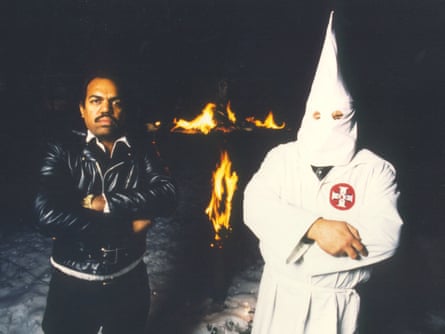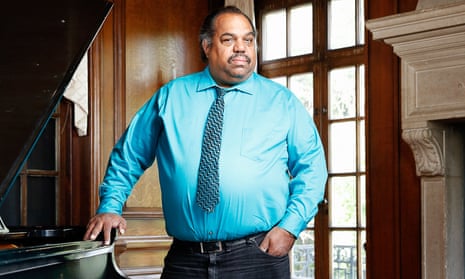Daryl Davis is a musician – a pianist to be exact. He has jammed with the likes of Chuck Berry, Jerry Lee Lewis, BB King and even Bill Clinton. Loyal to music but not to genre, he plays jazz, blues, rock’n’roll, country, boogie-woogie, swing, big band and beyond. No matter the musical style, Davis will play it, because he believes that music in all its variations is a great equalizer. So when he entered the Silver Dollar Lounge in Frederick, Maryland, for a country gig one fateful night in 1983, being the only black man present did not perturb him at all.
While this was not his first country gig at the Silver Dollar Lounge, it was his most significant. After he and his band finished their set, Davis was approached by a patron who was around 15 years his senior. Not an unusual occurrence for a working musician. However, while praising Davis on his performance, the patron candidly noted that he had never seen a black man who could play like Jerry Lee Lewis.
More curious than offended, Davis used this encounter as an opportunity for friendly discourse rather than outrage. “I explained to this older white guy that Jerry Lee Lewis was influenced by the same black boogie-woogie and blues piano players as I was,” Davis says with a chuckle. “He didn’t believe me. Then I told him that Jerry Lewis is a good friend of mine and well, he didn’t believe that either, but he was fascinated.”
“So he asks me to join him for a drink,” he continues. “I don’t drink so I had a glass of cranberry juice and then he took his glass and cheered me. Then he said, ‘You know, this is the first time I ever sat down and had a drink with a black person.’ I was instantly curious and thought, ‘What’s going on here?’ So I asked him why. He didn’t answer at first but eventually admitted that he was a member of the Ku Klux Klan.”
This is a story Davis shares on lecture stages and in classrooms – both nationally and globally. It is an important anecdote as it marks a catalytic moment in which Davis’s trajectory pivoted from working musician to race relations crusader.
What began as a hobby gradually transformed into a calling. As his music career continued to flourish, Davis also became enmeshed in quite arguably the world’s strangest side hustle – meeting with KKK members of various ranks and attending so-called cross lighting rallies. Some of these Klansmen became close friends of Davis’s – the aforementioned Silver Dollar patron included – their long conversations untangling a knot of hate that had coiled for decades. In many cases, these civil dialogues led them to quitting the organization because they no longer believed in its tenets.

While some say Davis converted these men, he prefers to say that they converted themselves, and that he merely provided the impetus for them to do so. Over the past 30 years, Davis has become well-versed in the organization’s ethos and hierarchy which led to him to becoming the first black man to write a book about the KKK entitled Klan-destine Relationships: A Black Man’s Odyssey in the Ku Klux Klan, which was published in 1998.
The Ku Klux Klan was formed in 1865 by a group of Confederate soldiers at the end of the American civil war in an attempt to keep newly emancipated slaves suppressed. Having seen several iterations, what remains consistent across all chapters of the group is its hate toward people of color, sometimes resulting in assault and murder. In 2018, 153 years later, a record high of more than 1,000 hate groups – including the KKK – were documented as active in the United States by the Southern Poverty Law Center civil rights group. “Our ideology needs to catch up to our technology,” Davis said recently as a guest on the Joe Rogan Experience podcast.
So why would a successful musician like Davis willingly meet with high-ranking KKK members in his spare time? The journey to that answer begins long before his Silver Dollar Klan encounter in 1983.
“In 1968, when I was the age of 10, I had a racist incident,” Davis recalls with conviction, his voice sonorous and unwavering. “I was in the Cub Scouts and we were in a parade when people started throwing rocks and things at me. I didn’t understand why people would do that and I formed a question: ‘How can you hate me when you don’t even know me?’”
“The answer was always, ‘there’s some people who are just like that,’” Davis adds. “Well, that wasn’t good enough for me. What does ‘just like that’ mean? Where does that come from? You’re not born ‘just like that. I was curious about racism ever since, but even still, nobody can seem to answer the question.”
One of Davis’s first and most fabled encounters was with Grand Dragon Robert Kelly, who eventually became the Imperial Wizard of Maryland. After having his secretary set up a meeting with Kelly under the pretense of including him in a book about the KKK, Davis knew he was entering new territory. Kelly was unaware that Davis was black, so the grand reveal was a shock. After a few tense hours of conversation, the two parted ways, but their relationship did not end there.
Eventually, Kelly began inviting Davis to his home and then to Klan rallies in which ritualistic chants were intoned, giant crosses were burned, and beer and hot dogs were served. Kelly shared everything with him, including the deeply racial stereotypes that help form the foundation of the Klan’s hatred. All the while, Davis listened, asked questions, took notes, and through his actions, slowly dispelled each stereotype one by one. With each conversation, the gap between them narrowed and they were able to become friends.
Finally, Kelly quit the Klan, shut down his entire chapter and, as a trophy of sorts, gave his robe to Davis. That was not the last Ku Klux Klan robe that Davis would be gifted nor was it the last Klansman he would befriend.
“I still perform sometimes and though I would much rather be on stage playing happy music all the time and seeing people dance than be talking about the KKK and neo-Nazis,” Davis says with a laugh, “I have found that lecturing and talking and educating people is far more important and necessary today.”
Davis has lived through several eras of hate – from the assassination of Martin Luther King Jr in 1968 to the “Unite the Right” rally in Charlottesville, Virginia, in 2017. Though he has convinced hundreds of white supremacists to deradicalize and join the land of the loving, he does not deny that some are beyond saving. However, that acknowledgment does not deter his mission as he continues to focus on those who are open to conversation, open to civil discourse, open to friendship, and ultimately, open to change.
Most recently, Davis partnered with Minds.com, an open source social networking platform that uses blockchain to reward the community with ERC20 tokens. Davis hopes to utilize this platform, founded by Bill Ottman and John Ottman, to educate people on how to conduct civil discourse. Beyond the world of white supremacy, the idea is to help individuals navigate through opposing perspectives – be it at a political protest, in a classroom, on social media, or at the dinner table.
“People must stop focusing on the symptoms of hate, that’s like putting a Band-Aid on cancer,” Davis says. “We’ve got to treat it down to the bone, which is ignorance. The cure for ignorance is education. You fix the ignorance, there’s nothing to fear. If there’s nothing to fear, there’s nothing to hate. If there’s nothing to hate, there’s nothing or no one to destroy.”
